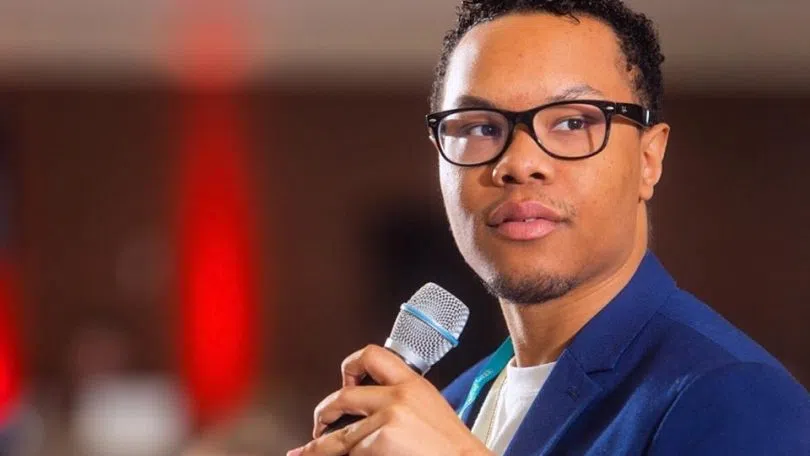
NBSA Executive Director Kjeld Conyers-Steede. (Submitted)
The New Brunswick Student Alliance (NBSA), which represents approximately 12,000 post-secondary students, disagrees with the provincial government’s direction on the Student Employment Experience Development (SEED) program.
Post-Secondary Education, Training and Labour Minister Trevor Holder announced changes to the program last week that would cut the number of placements by approximately 200, and limit the types of employers to First Nations, municipalities, and non-profit groups.
The change also will allow MLAs to recommend 22 placements each in their riding.
“When you look at the change in particular when it comes to the focus on community development, NBSA doesn’t have a problem with that,” says executive director Kjeld Mizpah Conyers-Steede. “However, what we do have an issue with is now MLAs are influencing the decisions in the placement, and most importantly, the decrease in the seats.”
“That means 200 students will lose the opportunity to build potential professional connections within the province,” he added, noting that involving MLAs politicizes the process, contrary to what the provincial government said it aims to do.
The NBSA has advocated removing politicians from the selection process to ensure fairness and equality. Moving away from the previous model where vouchers were given directly to students is a mistake, it said.
The NBSA says it’s important to focus on non-profit organizations and communities, but the changes also limit the variety of work opportunities available for students, particularly for those who are interested in working within the business sector. Startups are among the types of private sector organizations that will lose access to SEED.
However, the alliance recognizes that other programs, like FutureReadyNB, can fill this gap.
“That’s why the NBSA hasn’t really taken a strong stance when it comes to the exclusion of private companies, because we know FutureReadyNB and other programs are there for the private sector and students to connect through that way,” he said. “When it comes to SEED, we do value the importance of having a community focus especially when it comes to First Nations communities.”
Conyers-Steede says the SEED program needs to evolve, and a change is good. But he wanted students’ voices to be involved in the process.
“NBSA wasn’t consulted with these changes and NBSA would have loved the opportunity to develop the 2.0 of SEED,” he said. “If it’s a program to improve students’ experience and provide them meaningful employment post graduating, the students need to be in that conversation about where they want to work or what organizations would need them.”
Conyers-Steede urges the province to have a conversation about the strategic direction for post-secondary education in the province that includes all stakeholders at the table, especially the students who are “investing in the system.”
“We need to really reinvent how we engage with students,” he said. “We need a strategic vision for post-secondary education … we need to have a tough conversation of what do we want our future to be and young people are a part of that conversation.”
A SEED alumni himself, Conyers-Steede says he understands how students can benefit from the program.
“I am still in this province because of my placement with SEED,” he said. “My first employment within New Brunswick was with the Uptown Saint John business improvement association, and the only way that I received my funding to work with that organization was because of SEED and that really started me on my quest of understanding public policy and economic development.”
Minister Says Change Was Needed
Minister Holder is responding to concerns around the SEED program changes.
Holder says shifting the program’s focus to non-profits and community development is what’s causing the drop in available placements.
“That’s why you saw the decrease from around 1,400 to 1,200. It’s just simply more expensive to make sure that you’re taking care of the non-profits that it was the private sector because the private sector was only half-funded by the taxpayer,” he said.
Holder says the budget for the program won’t be decreasing, just allocated differently.
He adds the drop in placements is mitigated through other experiential learning programs, such as FutureReadyNB.
Holder says MLAs are the ones best equipped to help with SEED placements, adding the process for matching students with employers has been “completely de-politicized.”
“There were a lot of complications with the voucher system,” he said.
“In the past, opposition ridings got fewer students than government ridings, and we didn’t believe that was fair. We believe the MLAs need to be empowered. They’re elected at the local level, they understand their communities better than anyone.”
Holder says the decision to include MLAs in the decision-making process again just made more sense.
“We’re going to get a lot of applications. Somebody has to be involved in that decision-making process. They (MLAs) are much more equipped to understand the needs of the community than somebody sitting in an office in the post-secondary education department in Fredericton,” he said.
The application process for employers is now open online.
With files from Danielle McCreadie and Inda Intiar
A version of this story was published in Huddle, an online business news publication based in Saint John. Huddle is an Acadia Broadcasting content partner.






